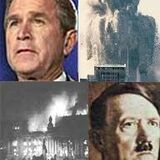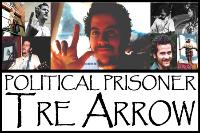Wednesday, August 2
British judicially leap-frog stonewalled American public for access to Bush-Blair pre-Iraq War planning
Yours is not to reason why.
Yours is but to do and die.
--paraphrase of George Bush's response to a reporter's question about Iraqi nuclear weapons capabilities, September 2002
Since 2004, American military mom and anti-war activist Cindy Sheehan, whose son Casey was killed fighting in Iraq, has sought a meeting with George Bush to ask her commander-in-chief why Casey died for this country.
But if a British Court of Appeal follows through on a preliminary ruling in London last week (26 July), the explanation Ms. Sheehan wants may come instead from judicially declassified Downing Street memos.
Like Ms Sheehan, the American public has been stonewalled by the White House and U.S. Congress from a full accounting of how the country was dragged into yet another bogus war. Until Congress is sufficiently reconstituted after the November 7 midterm elections to initiate formal hearings on the matter, memos similar to those leaked in 2005 to The Times of London may provide more pieces to the puzzle of Iraq's invasion.
Continued U.S. Senate Stonewalling
Within months of the US-led invasion of Iraq in March 2003, parents of deployed American soldiers openly questioned the White House's reasons for asking their children to make the ultimate sacrifice. By the time the New York Times and Washington Post were issuing mea culpas to readers in mid-2004 for poorly investigating the White House's case for war--that Iraqi weapons of mass destruction threatened America and its allies and Saddam Hussein had aided al-Qaida in the 9/11 terrorist attacks--Americans already were seeking answers about the real motives that placed their children in harm's way.
Not to be outdone by the apparent ineptness of the White House and corporate media, Congress shrieked its constitutional mandate to formally investigate how the nation ended up fostering more Middle Eastern terrorism in the name of democracy through a fraudulent war costing billions of dollars and thousands of American and Iraqi lives.
Arguably, the U.S. Senate has been the most derelict in its constitutionally- mandated duty to investigate the case for war. After providing Bush's reelection campaign in July 2004 with a senate report faulting CIA "group think" for flawed prewar intelligence leading to war, Republican Senator Pat Roberts of Kansas publicly promised that his Senate Intelligence Committee would investigate widely reported intentional misuse of that "flawed" intelligence by senior Bush administration officials.
But the second study repeatedly has been delayed. Through Roberts originally stated it would be completed after the 2004 elections, he has encountered opposition in marginalizing politically damaging information neither he, the White House nor the Republican Party want the American public to see.
A major obstacle to Roberts' intended whitewash is West Virginia Senator Jay Rockefeller, the Senate Intelligence Committee's Democrat vice chairman. A week before the invasion of Iraq, Rockefeller asked FBI Director Robert Mueller to investigate the Bush administration's use in congress of forged Nigerian documents allegedly demonstrating Saddam Hussein's had sought the infamous Nigerian "yellowcake" uranium needed to construct nuclear weapons.
According to a 14 March 2003 USA Today story,
Rockefeller said U.S. worries about Iraqi nuclear weapons were not based primarily on the documents, but "there is a possibility that the fabrication of these documents may be part of a larger deception campaign aimed at manipulating public opinion and foreign policy regarding Iraq."
So the report's long delay could suggest Senate Democrats on Roberts' intelligence committee have yet to roll over for the fully sanitized whitewash of the White House's "fixed" prewar intelligence revealed in the first batch of Downing Street memos obtained by The London Times.
On Sunday (30 July), the Washington Post indicated the second Senate Intelligence Committee report will not be completed until after the November midterm elections.
Although the White House, the congressional Republican leadership, corporate media and FBI showed no interest pursuing Rockefeller's damning allegation, Special Prosecutor Patrick Fitzgerald found in those forged Nigerian documents enough complicity in the White House to indict one senior official with a demonstrated literary talent for scatalogy, incest and homoeroticism.
British Families of Fallen Soldiers Given Preliminary Access to War Evidence
But a recent ruling by a top UK Court of Appeals may help the British public obtain evidence of Downing Street's prewar planning occasioning the British military's participation in the Iraq War.
In what UK court observers called "a stunning victory," a panel of top British judges agreed with the families of four soldiers killed in Iraq that Downing Street officials must publicly explain why the UK entered the Iraq War.
Phil Shiner, a solicitor for Public Interest Lawyers who successfully argued the families' case before the judicial panel, told court reporters the decision would at minimum "force the Government to publish evidence on how the country was taken to war."
Shiner further explained.
"In particular, the Government must finally explain how the 13-page equivocal advice from the Attorney General of March 7, 2003 was changed within 10 days to a one-page completely unequivocal advice that an invasion would be legal."
"My clients believe [Attorney General Goldsmith] impermissibly changed his advice because he was sat on by the Prime Minister and others in Government.
"In changing his advice, he sent these soldiers to their deaths."
The U.S.-led invasion began March 20, three days after Goldsmith reversed his March 7 ruling suggesting British participation might be illegal under international law.
In what can not be a coincidence of timing, the soldiers' families are scheduled to receive a final ruling by the same three judges either one or two days after the U.S. November elections.
"I am convinced that my son died for no good reason as he should not have been sent to Iraq in the first place," said Peter Brierley, the father of Shaun Brierley who was killed serving with the British military in Iraq. "I am looking forward to hearing the ... defendants having to explain how they justify the invasion."
We Americans eagerly await Downing Street's explanation as well, Mr. Brierley.
Yours is but to do and die.
--paraphrase of George Bush's response to a reporter's question about Iraqi nuclear weapons capabilities, September 2002
Since 2004, American military mom and anti-war activist Cindy Sheehan, whose son Casey was killed fighting in Iraq, has sought a meeting with George Bush to ask her commander-in-chief why Casey died for this country.
But if a British Court of Appeal follows through on a preliminary ruling in London last week (26 July), the explanation Ms. Sheehan wants may come instead from judicially declassified Downing Street memos.
Like Ms Sheehan, the American public has been stonewalled by the White House and U.S. Congress from a full accounting of how the country was dragged into yet another bogus war. Until Congress is sufficiently reconstituted after the November 7 midterm elections to initiate formal hearings on the matter, memos similar to those leaked in 2005 to The Times of London may provide more pieces to the puzzle of Iraq's invasion.
Continued U.S. Senate Stonewalling
Within months of the US-led invasion of Iraq in March 2003, parents of deployed American soldiers openly questioned the White House's reasons for asking their children to make the ultimate sacrifice. By the time the New York Times and Washington Post were issuing mea culpas to readers in mid-2004 for poorly investigating the White House's case for war--that Iraqi weapons of mass destruction threatened America and its allies and Saddam Hussein had aided al-Qaida in the 9/11 terrorist attacks--Americans already were seeking answers about the real motives that placed their children in harm's way.
Not to be outdone by the apparent ineptness of the White House and corporate media, Congress shrieked its constitutional mandate to formally investigate how the nation ended up fostering more Middle Eastern terrorism in the name of democracy through a fraudulent war costing billions of dollars and thousands of American and Iraqi lives.
Arguably, the U.S. Senate has been the most derelict in its constitutionally- mandated duty to investigate the case for war. After providing Bush's reelection campaign in July 2004 with a senate report faulting CIA "group think" for flawed prewar intelligence leading to war, Republican Senator Pat Roberts of Kansas publicly promised that his Senate Intelligence Committee would investigate widely reported intentional misuse of that "flawed" intelligence by senior Bush administration officials.
But the second study repeatedly has been delayed. Through Roberts originally stated it would be completed after the 2004 elections, he has encountered opposition in marginalizing politically damaging information neither he, the White House nor the Republican Party want the American public to see.
A major obstacle to Roberts' intended whitewash is West Virginia Senator Jay Rockefeller, the Senate Intelligence Committee's Democrat vice chairman. A week before the invasion of Iraq, Rockefeller asked FBI Director Robert Mueller to investigate the Bush administration's use in congress of forged Nigerian documents allegedly demonstrating Saddam Hussein's had sought the infamous Nigerian "yellowcake" uranium needed to construct nuclear weapons.
According to a 14 March 2003 USA Today story,
Rockefeller said U.S. worries about Iraqi nuclear weapons were not based primarily on the documents, but "there is a possibility that the fabrication of these documents may be part of a larger deception campaign aimed at manipulating public opinion and foreign policy regarding Iraq."
So the report's long delay could suggest Senate Democrats on Roberts' intelligence committee have yet to roll over for the fully sanitized whitewash of the White House's "fixed" prewar intelligence revealed in the first batch of Downing Street memos obtained by The London Times.
On Sunday (30 July), the Washington Post indicated the second Senate Intelligence Committee report will not be completed until after the November midterm elections.
Although the White House, the congressional Republican leadership, corporate media and FBI showed no interest pursuing Rockefeller's damning allegation, Special Prosecutor Patrick Fitzgerald found in those forged Nigerian documents enough complicity in the White House to indict one senior official with a demonstrated literary talent for scatalogy, incest and homoeroticism.
British Families of Fallen Soldiers Given Preliminary Access to War Evidence
But a recent ruling by a top UK Court of Appeals may help the British public obtain evidence of Downing Street's prewar planning occasioning the British military's participation in the Iraq War.
In what UK court observers called "a stunning victory," a panel of top British judges agreed with the families of four soldiers killed in Iraq that Downing Street officials must publicly explain why the UK entered the Iraq War.
Phil Shiner, a solicitor for Public Interest Lawyers who successfully argued the families' case before the judicial panel, told court reporters the decision would at minimum "force the Government to publish evidence on how the country was taken to war."
Shiner further explained.
"In particular, the Government must finally explain how the 13-page equivocal advice from the Attorney General of March 7, 2003 was changed within 10 days to a one-page completely unequivocal advice that an invasion would be legal."
"My clients believe [Attorney General Goldsmith] impermissibly changed his advice because he was sat on by the Prime Minister and others in Government.
"In changing his advice, he sent these soldiers to their deaths."
The U.S.-led invasion began March 20, three days after Goldsmith reversed his March 7 ruling suggesting British participation might be illegal under international law.
In what can not be a coincidence of timing, the soldiers' families are scheduled to receive a final ruling by the same three judges either one or two days after the U.S. November elections.
"I am convinced that my son died for no good reason as he should not have been sent to Iraq in the first place," said Peter Brierley, the father of Shaun Brierley who was killed serving with the British military in Iraq. "I am looking forward to hearing the ... defendants having to explain how they justify the invasion."
We Americans eagerly await Downing Street's explanation as well, Mr. Brierley.











